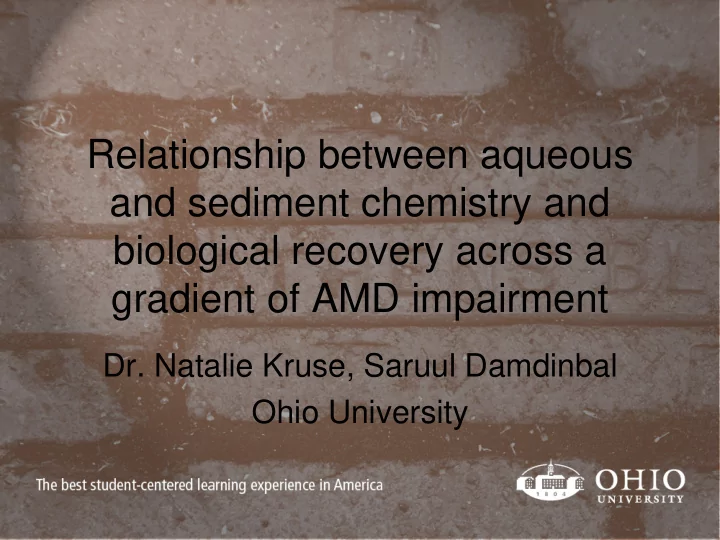

Relationship between aqueous and sediment chemistry and biological recovery across a gradient of AMD impairment Dr. Natalie Kruse, Saruul Damdinbal Ohio University
Effect of Metals on Biology?? • Past data suggests some aqueous metals are negatively correlated with macroinvertebrate health • Little suggestion on the role of sediment metals
62 sites across a gradient of impairment All have aqueous and sediment chemistry measurements and over 5 years of macroinvertebrate assessment
Zones of Recovery • Unimpaired • Recovered • Transition • Impaired
Aqueous Chemistry
Test of Similarity Between Zones of Recovery
pH by Impairment Zone
Conductivity by Impairment Zone
Conductivity by Watershed
Acidity and Alkalinity by Impairment Zone
Metals by Impairment Zone
Aqueous Chemistry vs. Macroinvertebrates • Statistically significant relationships between Fe, Al, Mn, and Acidity with MAIS (Macroinvertebrate Aggregrate Index for Streams) metric
Iron vs MAIS
Aluminum vs. MAIS
Manganese vs. MAIS
Acidity vs. MAIS
Sediment Chemistry
Test of Similarity Between Zones of Recovery
Metals by Impairment Zone
Sediment Chemistry vs. Macroinvertebrates • Statistically significant relationships between Fe, As, Mn, Cu, and Ca with MAIS (Macroinvertebrate Aggregrate Index for Streams) metric • Mn, Cu, Ca regressions are nearly flat, so the relationship isn’t suggestive
Sediment Iron vs. MAIS
Sediment Arsenic vs. MAIS
Sediment Manganese vs. MAIS Significant relationship, but nearly flat, so what does it mean?
Sediment Copper vs. MAIS
Sediment Calcium vs. MAIS
Conclusions • Some aqueous parameters are statistically similar between zones of recovery, while no sediment chemistry parameters are similar • Strongest relationship between aqueous Fe, Al, Mn, and acidity with MAIS • Strongest relationship between sediment Fe and As with MAIS
Conclusions, cont. • Continued focus should remain on aqueous chemistry • Sediments are the sink for metals – can’t ignore them • Sediment Fe and As have consistently been related with lower MAIS scores – They can co-precipitate – Could be habitat alteration, food quality, or binding of N and P rather than toxicity
Thank you!
Recommend
More recommend